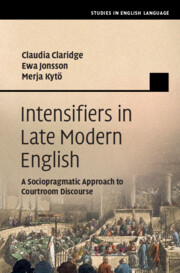Book contents
- Intensifiers in Late Modern English
- Studies in English Language
- Intensifiers in Late Modern English
- Copyright page
- Dedication
- Contents
- Figures
- Tables
- Acknowledgements
- Abbreviations and Notations
- Chapter 1 Introduction
- Chapter 2 Theoretical and Methodological Considerations
- Chapter 3 Intensifiers
- Chapter 4 Corpus Methodology and Overview of Data
- Chapter 5 Maximizers
- Chapter 6 Boosters
- Chapter 7 Downtoners
- Chapter 8 Multivariate Analysis
- Chapter 9 Intensifiers across Time
- Chapter 10 The Pragmatics of Intensifiers
- Chapter 11 The Sociolinguistics of Intensifiers
- Chapter 12 Conclusion
- Book part
- Bibliography
- Index
Chapter 10 - The Pragmatics of Intensifiers
Published online by Cambridge University Press: 15 March 2024
- Intensifiers in Late Modern English
- Studies in English Language
- Intensifiers in Late Modern English
- Copyright page
- Dedication
- Contents
- Figures
- Tables
- Acknowledgements
- Abbreviations and Notations
- Chapter 1 Introduction
- Chapter 2 Theoretical and Methodological Considerations
- Chapter 3 Intensifiers
- Chapter 4 Corpus Methodology and Overview of Data
- Chapter 5 Maximizers
- Chapter 6 Boosters
- Chapter 7 Downtoners
- Chapter 8 Multivariate Analysis
- Chapter 9 Intensifiers across Time
- Chapter 10 The Pragmatics of Intensifiers
- Chapter 11 The Sociolinguistics of Intensifiers
- Chapter 12 Conclusion
- Book part
- Bibliography
- Index
Summary
The chapter details how the activity type of the courtroom trial and the specific speaker roles, that is, judges, lawyers, defendants, victims, and witnesses, influence the use of intensifiers. Speaker roles, and thus the persuasive aims typical of them, have been found to be more important determiners than gender and social class. Witness and victims are typically found to amplify aspects such as reliability, probability, and blamelessness. Witnesses also amplify the good character of defedants, while the latter themselves maximize their innocence. Lawyers use intensifiers, in particular amplifiers, to elicit the strongest possible answers from witnesses. Lawyers’ most persuasive uses are found in the adversarial legal speeches, where they boost both their own points and their denials of the other side’s arguments.
- Type
- Chapter
- Information
- Intensifiers in Late Modern EnglishA Sociopragmatic Approach to Courtroom Discourse, pp. 230 - 262Publisher: Cambridge University PressPrint publication year: 2024

